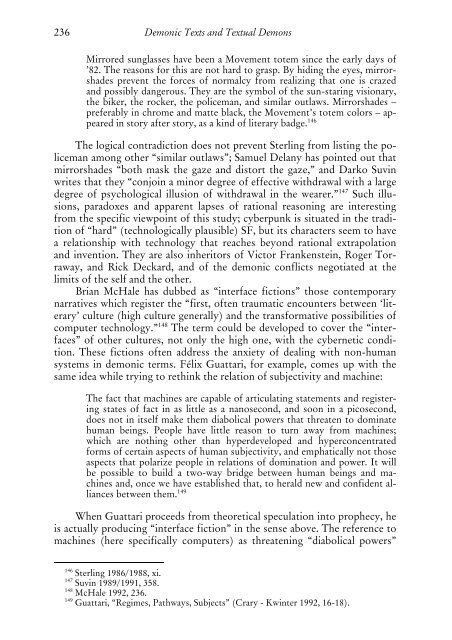Note on this edition: this is an electronic version of the 1999 book ...
Note on this edition: this is an electronic version of the 1999 book ...
Note on this edition: this is an electronic version of the 1999 book ...
Create successful ePaper yourself
Turn your PDF publications into a flip-book with our unique Google optimized e-Paper software.
236Dem<strong>on</strong>ic Texts <strong>an</strong>d Textual Dem<strong>on</strong>sMirrored sunglasses have been a Movement totem since <strong>the</strong> early days <strong>of</strong>’82. The reas<strong>on</strong>s for <strong>th<strong>is</strong></strong> are not hard to grasp. By hiding <strong>the</strong> eyes, mirrorshadesprevent <strong>the</strong> forces <strong>of</strong> normalcy from realizing that <strong>on</strong>e <strong>is</strong> crazed<strong>an</strong>d possibly d<strong>an</strong>gerous. They are <strong>the</strong> symbol <strong>of</strong> <strong>the</strong> sun-staring v<strong>is</strong>i<strong>on</strong>ary,<strong>the</strong> biker, <strong>the</strong> rocker, <strong>the</strong> policem<strong>an</strong>, <strong>an</strong>d similar outlaws. Mirrorshades –preferably in chrome <strong>an</strong>d matte black, <strong>the</strong> Movement’s totem colors – appearedin story after story, as a kind <strong>of</strong> literary badge. 146The logical c<strong>on</strong>tradicti<strong>on</strong> does not prevent Sterling from l<strong>is</strong>ting <strong>the</strong> policem<strong>an</strong>am<strong>on</strong>g o<strong>the</strong>r “similar outlaws”; Samuel Del<strong>an</strong>y has pointed out thatmirrorshades “both mask <strong>the</strong> gaze <strong>an</strong>d d<strong>is</strong>tort <strong>the</strong> gaze,” <strong>an</strong>d Darko Suvinwrites that <strong>the</strong>y “c<strong>on</strong>join a minor degree <strong>of</strong> effective withdrawal with a largedegree <strong>of</strong> psychological illusi<strong>on</strong> <strong>of</strong> withdrawal in <strong>the</strong> wearer.” 147 Such illusi<strong>on</strong>s,paradoxes <strong>an</strong>d apparent lapses <strong>of</strong> rati<strong>on</strong>al reas<strong>on</strong>ing are interestingfrom <strong>the</strong> specific viewpoint <strong>of</strong> <strong>th<strong>is</strong></strong> study; cyberpunk <strong>is</strong> situated in <strong>the</strong> traditi<strong>on</strong><strong>of</strong> “hard” (technologically plausible) SF, but its characters seem to havea relati<strong>on</strong>ship with technology that reaches bey<strong>on</strong>d rati<strong>on</strong>al extrapolati<strong>on</strong><strong>an</strong>d inventi<strong>on</strong>. They are also inheritors <strong>of</strong> Victor Fr<strong>an</strong>kenstein, Roger Torraway,<strong>an</strong>d Rick Deckard, <strong>an</strong>d <strong>of</strong> <strong>the</strong> dem<strong>on</strong>ic c<strong>on</strong>flicts negotiated at <strong>the</strong>limits <strong>of</strong> <strong>the</strong> self <strong>an</strong>d <strong>the</strong> o<strong>the</strong>r.Bri<strong>an</strong> McHale has dubbed as “interface ficti<strong>on</strong>s” those c<strong>on</strong>temporarynarratives which reg<strong>is</strong>ter <strong>the</strong> “first, <strong>of</strong>ten traumatic encounters between ‘literary’culture (high culture generally) <strong>an</strong>d <strong>the</strong> tr<strong>an</strong>sformative possibilities <strong>of</strong>computer technology.” 148 The term could be developed to cover <strong>the</strong> “interfaces”<strong>of</strong> o<strong>the</strong>r cultures, not <strong>on</strong>ly <strong>the</strong> high <strong>on</strong>e, with <strong>the</strong> cybernetic c<strong>on</strong>diti<strong>on</strong>.These ficti<strong>on</strong>s <strong>of</strong>ten address <strong>the</strong> <strong>an</strong>xiety <strong>of</strong> dealing with n<strong>on</strong>-hum<strong>an</strong>systems in dem<strong>on</strong>ic terms. Félix Guattari, for example, comes up with <strong>the</strong>same idea while trying to rethink <strong>the</strong> relati<strong>on</strong> <strong>of</strong> subjectivity <strong>an</strong>d machine:The fact that machines are capable <strong>of</strong> articulating statements <strong>an</strong>d reg<strong>is</strong>teringstates <strong>of</strong> fact in as little as a n<strong>an</strong>osec<strong>on</strong>d, <strong>an</strong>d so<strong>on</strong> in a picosec<strong>on</strong>d,does not in itself make <strong>the</strong>m diabolical powers that threaten to dominatehum<strong>an</strong> beings. People have little reas<strong>on</strong> to turn away from machines;which are nothing o<strong>the</strong>r th<strong>an</strong> hyperdeveloped <strong>an</strong>d hyperc<strong>on</strong>centratedforms <strong>of</strong> certain aspects <strong>of</strong> hum<strong>an</strong> subjectivity, <strong>an</strong>d emphatically not thoseaspects that polarize people in relati<strong>on</strong>s <strong>of</strong> dominati<strong>on</strong> <strong>an</strong>d power. It willbe possible to build a two-way bridge between hum<strong>an</strong> beings <strong>an</strong>d machines<strong>an</strong>d, <strong>on</strong>ce we have establ<strong>is</strong>hed that, to herald new <strong>an</strong>d c<strong>on</strong>fident alli<strong>an</strong>cesbetween <strong>the</strong>m. 149When Guattari proceeds from <strong>the</strong>oretical speculati<strong>on</strong> into prophecy, he<strong>is</strong> actually producing “interface ficti<strong>on</strong>” in <strong>the</strong> sense above. The reference tomachines (here specifically computers) as threatening “diabolical powers”146 Sterling 1986/1988, xi.147Suvin 1989/1991, 358.148 McHale 1992, 236.149Guattari, “Regimes, Pathways, Subjects” (Crary - Kwinter 1992, 16-18).














